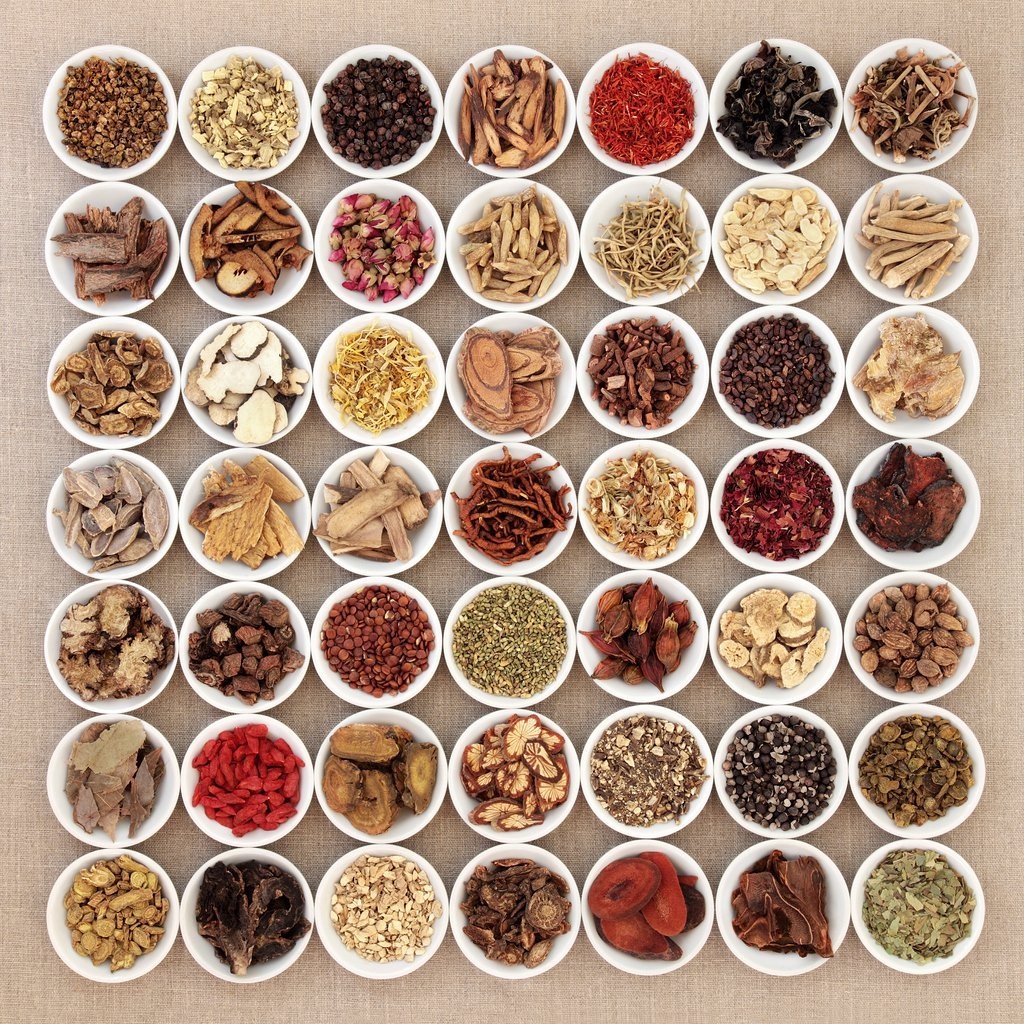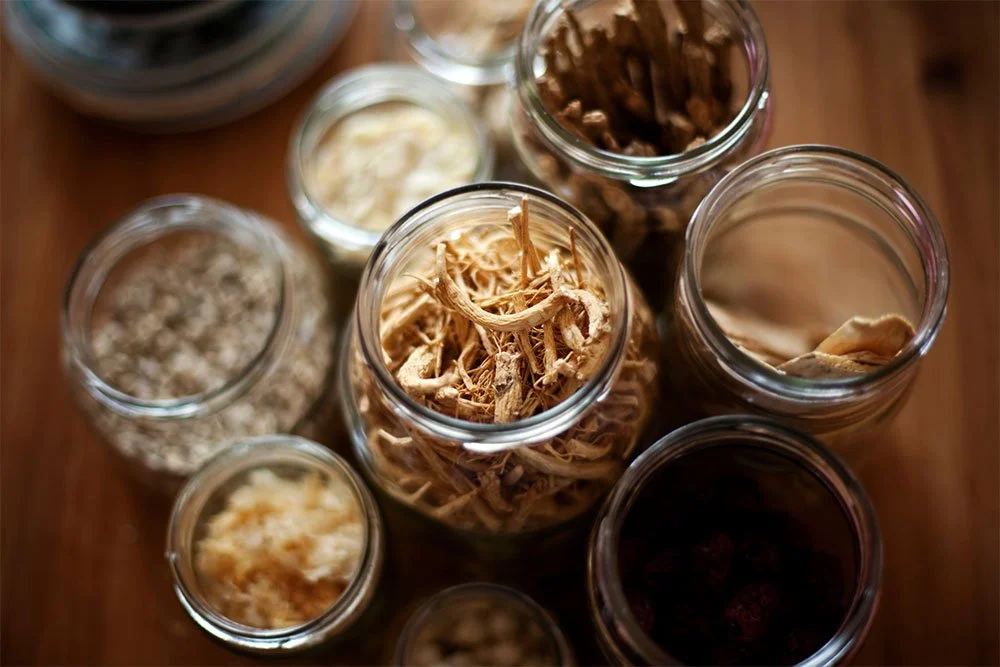Western drugs are an amazing and a miracle of the modern era. They tend be fast acting but sometimes exact a toll. Though life saving, they are often over prescribed and tend towards side effects that can throw off the internal balance of the body. Historically, the primary therapy of choice in China is herbal medicine -- acupuncture and other physical modalities of therapy (i.e. massage / tui-na) are often secondary or even tertiary.
When prescribed correctly, Chinese herbal formulas have strong therapeutic effects without disrupting the body's balance or creating other health problems. Formulas allow for various symptoms to be treated at once since they can be tailored specifically to your symptoms and unique constitution.
Chinese Herbs should ONLY be taken under the supervision of a practitioner who is nationally certified in either Chinese Herbology or Oriental Medicine by the NCCAOM (National Certification Commission for Acupuncture and Oriental Medicine). Herbal certification is an endeavor that takes years to achieve and is considered a practice of continual study through one's lifetime. In the U.S., only practitioners who have achieved and maintain NCCAOM certification in Chinese Herbology or Oriental Medicine can be considered competent Chinese herbalists.
Acupuncture vs Herbs
In the United States, many acupuncturists are also certified herbalists. In China, acupuncture and herbology are considered separate professions with separate hospital departments; however, in China one "course of acupuncture treatment" may be daily treatments for up to 3 weeks. For most of us in the west, such treatment regimens are cost prohibitive and logistically difficult. One reason many (though not all) east Asian medicine practitioners in the U.S. prescribe herbs is to supplement acupuncture treatments between visits in lieu of a daily appointment.
The other advantage of herbs is that it can be difficult for a practitioner of Chinese medicine to bring a person into balance with acupuncture alone if a patient's overall physical system is considered "deficient".
Acupuncture excels at harmonizing what already exists in the body since it calls on the system's own resources to heal.
For example, if a woman comes in for treatment because she's overly fatigued and it's determined the exhaustion stems from a heavy menstrual cycle leaving her anemic - the practitioner will most likely use acupuncture to balance her hormones and prescribe herbs to help build her blood. A trained practitioner will be able to determine what may be lacking in the system, whether that’s Blood, Qi, Yin, or Yang, and prescribe herbal remedies to assist the patient in receiving a better acupuncture outcome.
What's Really in These "Formulas"?
Fantastic question. Anything we ingest integrates into our molecular make-up -- inclusive of not only the air we breath and the food we eat, but the medicines we take.
Traditional herbal formulas are not "supplements." They are plant medicines given to us by nature and understood through thousands of years of clinical experience.
Herbs are rarely taken alone; rather, they are taken in combinations with each other that are known to have a specific effect. When mixed, matched, and used together, the unique combos create a "formula". Most formulas have been passed down to us from antiquity. However, a trained practitioner with clinical experience is able to either "modify" a known formula or create a new one to address the patient's individual symptoms and constitution. This also means that the therapeutic effect is more than the sum total of the formula's parts; if you remove a single herb from a complex formula, the formula might not actually work.
If you ever have questions about a formula, ask your practitioner for a full explanation of not only what is in the prescription, but how each herb works and how the herbs work together. If you're receiving a 600 year old formula, you may receive a 20 minute explanation - but it shows you've chosen the right herbalist.
How to Take Herbs
Formulas are prescribed a few different ways; as raw herbs, granules, patents, tinctures, wines, poultices, washes, or injections. In the U.S., we generally stick to basics:
Raw herbs are given to the patient usually in wrapped paper with instructions on how to cook the herbs at home. This is the strongest form of herbs available - however, it tends to be laborious and you need the right kitchen equipment to do it correctly. As westerners, cooking herbs is often not something we grew up with and though simple in appearance, it runs the risk of being done incorrectly. Most practitioners in the U.S. do not prescribe this form, or if we do we will have the herbal pharmacies prepare the raw herbs and deliver them to the patient in sealed vacuum packages to ensure they've been prepared correctly.
Granules are herbs that have been processed and dried which are then taken either as a decoction when added to water or encapsulated and taken as pills. This gives the practitioner the ability to modify or create individual formulas, gives the patient an EZ Pass to preparation, and is still effective. Some practitioners keep a granule pharmacy in their office or maintain a relationship with a local Chinese herbal dispensary that can mix or encapsulate the granules.
Patents are ready-made pills that have been created by a company holding the patent in which the ingredients and expected outcome are known, but the ratio of herbs are proprietary to the manufacturer. The pills may feel a bit more familiar, but this is where you need to be using a brand stamped with GMP (Good Manufacturing Product) seal that ensures the patents are being regularly tested for quality control. Many practitioners keep a few of these on hand in the office - especially in cold & flu season since it means the patient can get started on the herbs immediately.
Can Chinese Herbs Be Used While Taking Western Medications?
Yes. And No.
It is VITAL that you provide the practitioner with a complete list of all medications and supplements you are taking to avoid any negative interactions. Chinese medicine is a comprehensive medical system that can address many health concerns on its own. However, research is beginning to show that some herbs have a tendency to work synergistically with western medicine and other modalities of health care.
There are specific herbs that are known to interact with such drugs as Warfarin or SSRI's. Therefore, your practitioner will not prescribe these herbs. As with pharmaceuticals, it's important to avoid taking herbs with coffee or tea and to follow further instructions your practitioner gives you.





